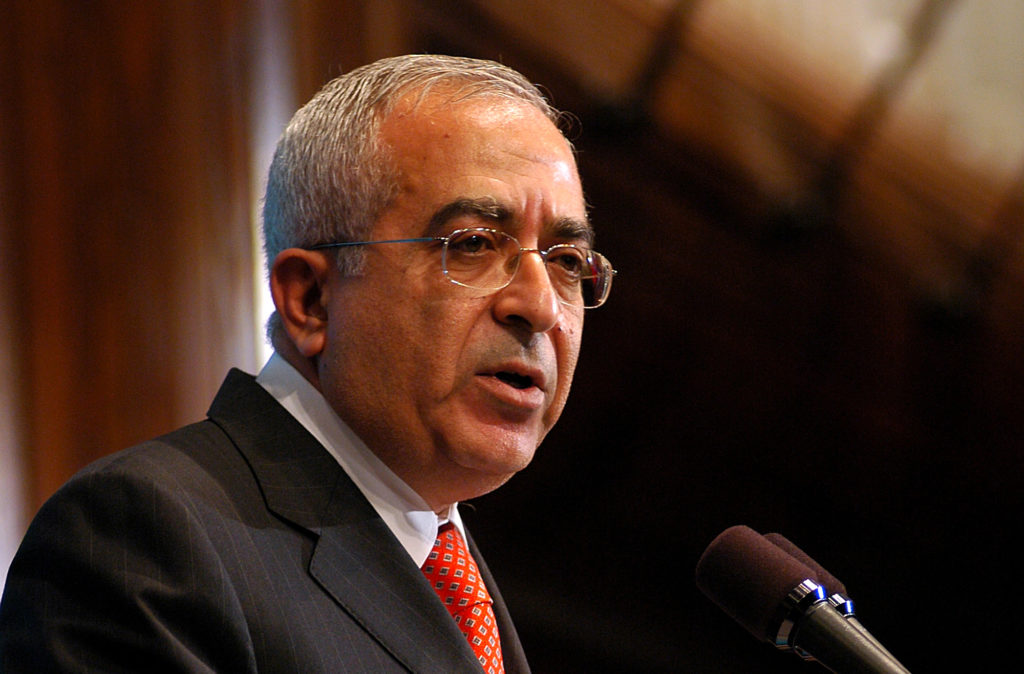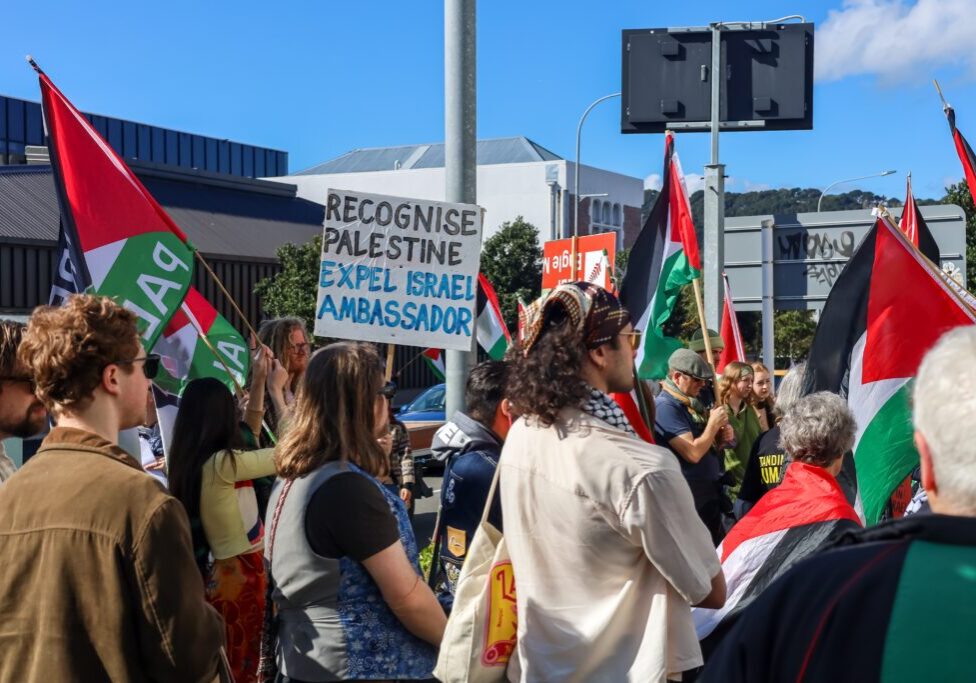Australia/Israel Review
Fayyad Out
Apr 29, 2013 | David Makovsky

The scapegoating of a Palestinian PM
David Makovsky
On April 13, Palestinian Authority (PA) Prime Minister Salam Fayyad tendered his resignation amid ongoing tension with President Mahmoud Abbas and the ruling Fatah faction. For now, he will remain in office as caretaker Premier, but his departure – whenever it comes – could be a blow to the Palestinians, particularly in terms of how much international aid they receive once he is gone.
FAYYAD THE SAVIOUR
A US-trained economist who worked at the International Monetary Fund for 14 years, Fayyad became the PA’s Finance Minister in 2002 upon demand by donor countries ,who were concerned that their contributions were being diverted for corruption. Once in office, he made the PA change its approach from that seen at the end of the Arafat era, whereby security personnel were paid via paper bags full of cash. Fayyad insisted that every such employee have a bank account and be paid on time.
After Hamas took over Gaza in 2007, Fayyad became prime minister. His tenure has since been defined by institution-building, including in the areas of finance and security – an approach that became known as “Fayyadism”. Security cooperation with Israel became the norm. As violence decreased and order returned to the street, Israel lifted many of its West Bank checkpoints, while the PA built 1,700 community development programs, 120 schools, 50 health clinics, and three hospitals. More than 1,600 kilometres of roads were paved and 1,360 kilometres of water pipes were installed. In 2011, the World Bank issued a report noting that the Palestinians had built institutions and infrastructure befitting a state.
In particular, Fayyad’s embrace of economic transparency – which included US-led audits – was instrumental in attracting increased international aid. Despite a deep worldwide recession, the IMF reported 9% growth for the West Bank between 2008 and 2010. As late as the second half of 2011, public support for Fayyad’s government was at 53%, 19 points ahead of the Hamas government in Gaza, according to Khalil Shikaki’s Palestinian Centre for Policy and Survey Research. Yet elements within the mainstream Fatah Party regarded Fayyad as Abbas’ rival, viewing him as a political independent and outsider who might eventually supersede their control over the PA post-Abbas.
FAYYAD THE SCAPEGOAT
Despite Fayyad’s initial success, a recent economic downturn in the West Bank has taken its toll. Amin Maqboul, Secretary-General of the Fatah Revolutionary Council, claimed that Fayyad resigned because he “failed to manage the economic crises, put the Palestinian Authority in debts of $1.5 billion, and was not able to provide salaries on time.” This criticism fit a longstanding pattern in which Fatah political elites have used Fayyad as a scapegoat for Palestinian economic troubles, in part out of resentment at his efforts to constrain patronage and corruption.
Yet blaming Fayyad for the latest downturn is especially audacious. After all, he repeatedly warned that Abbas’ statehood bids at the UN Security Council (September 2011) and General Assembly (November 2012) would spur Washington to cut off aid, and Israel to halt the transfer of Palestinian tax revenues. Last fall, he broke his hand in a meeting with Fatah members as he banged it on the table, vehemently arguing that it was irresponsible to go to the UN unless there were sufficient reserves to cover an aid slowdown. According to the World Bank, foreign aid constitutes 14% of Palestinian gross domestic product, and 22% of jobs are in the public sector.
Predictably, some funding was halted following the statehood campaign, and full salaries could not be paid to the 150,000 PA workers for months. Yet Abbas did not take responsibility for that development. Instead, Bassam Zakarneh, head of the Government Employees Union, called for strikes and led protests outside Fayyad’s office. A member of the Fatah Revolutionary Council, Zakarneh is known to be close to Abbas. While Fayyad offered his resignation as far back as late February, he continued to seek common ground to end the impasse. When Finance Minister Nabil Kasis quit in March over the inability to pay salaries, Fayyad accepted his resignation in accordance with the Palestinian Basic Law. Abbas refused to accept it, however. Fayyad then indicated his willingness to have Kasis return, provided the President follow the law and formally reappoint him. Abbas refused.
Around the time of US President Obama’s visit in March, Washington released US$500 million in aid to the Palestinians, and Israel resumed tax transfers, allowing PA salaries to be paid in full. Yet the political wrangling persisted. Although Abbas told US Secretary of State Kerry in April that he wanted Fayyad to remain in power, top presidential aide Azzam al-Ahmed told an Arabic satellite television outlet on Saturday that Washington was exerting pressure on Abbas and seeking to “humiliate” the PA. As Palestinian official Hanan Ashrawi put it, “There was a very public campaign trying to discredit [Fayyad], he became the scapegoat for everybody, the attacks became personal and infringed on his character.”
IMPLICATIONS OF FAYYAD’S DEPARTURE
A key question is whether Fayyad’s departure will reduce international confidence in Palestinian economic transparency and renew fears of misused funds. If the new prime minister is an Abbas crony, those fears will likely grow. Despite ongoing speculation, no candidate has yet been named. If Fayyad’s successor does not inspire sufficient trust among US and European donors, it will be interesting to see whether Qatar steps forward to fill the funding vacuum. So far, most of Doha’s Palestinian aid has gone to Hamas.
On the reconciliation front, Fayyad’s departure is unlikely to bring Fatah and Hamas together. Although Hamas long distrusted his focus on security cooperation with Israel, the group has already stated that his resignation will have no impact. For their part, senior PA officials have said that reconciliation is impossible so long as Hamas aims to take over the Palestine Liberation Organisation.
More broadly, Fayyad’s departure could affect the PA’s ability to avoid the upheaval that has swept the Arab world since 2011. Returning to pre-Fayyad economics and instituting a more authoritarian political system would be a recipe for disaster in the West Bank. Accordingly, Washington and other donors should consider demanding that the Palestinians open up their political system and enable the formation of robust parties. This could reduce manipulation and allow independents such as Fayyad – who might remain a key player on the political scene even after he steps down – to openly air their differences and compete on a level playing-field.
The departure of a trusted US ally might also affect Kerry’s efforts to revive Israeli-Palestinian peace talks. Although Fayyad was not involved in the negotiations, his focus on democratic governance and transparency provided a sense of reassurance about the future domestic trajectory of a Palestinian state. In addition, Kerry hopes to promote various economic projects in the West Bank, which may be more difficult to do without a credible partner like Fayyad. The US Secretary of State will also need to take extra care that security cooperation with Israel does not unravel in Fayyad’s absence.
Finally, the resignation is a reminder of the law of unintended consequences. The United States withheld money to protest Abbas’ decision to go to the UN, yet the PA President was able to manipulate that measure and scapegoat Fayyad instead.
David Makovsky is the Ziegler Distinguished Fellow and Director of the Project on the Middle East Peace Process at The Washington Institute for Near East Policy. © Washington Institute, reprinted by permission, all rights reserved.
Tags: Palestinians






